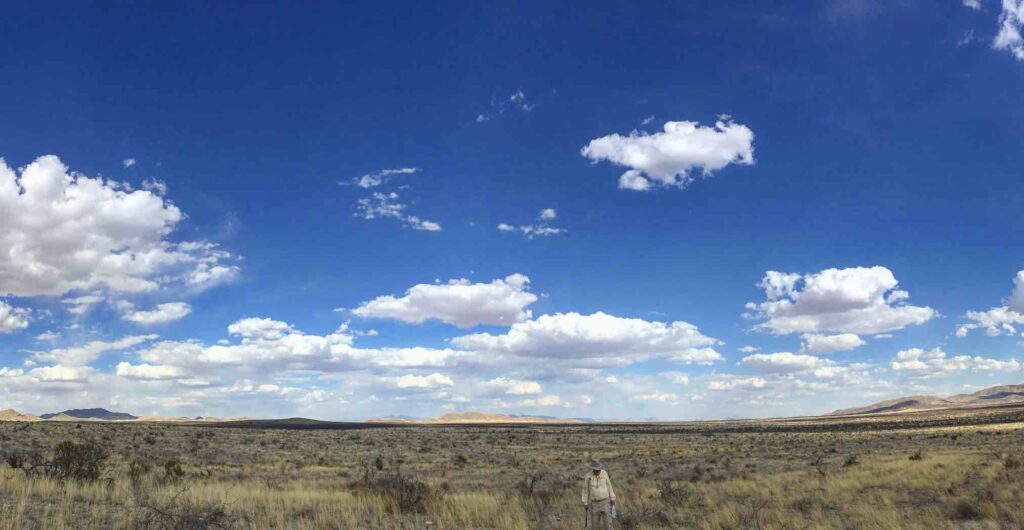“You don’t actually know where it is?” I asked.
“Well, it’s somewhere around here. In this general area. I remember this mesquite tree. Just give me a couple minutes,” he responded.
I paused for second before asking, “You don’t have some sort of GPS marking? Or a stake in the ground? Or maybe some pink tape tied to a bush? I mean, this is kind of important, right?”
“No. We don’t. But don’t worry, I’ll find it soon.”
I couldn’t believe it. Was this guy serious? He is the CEO of a publicly traded mining company and they don’t even have a way to find specific mineral deposit locations on the company’s land.
This was about three years ago. I had traveled to Southern Arizona to meet with several different mining companies to find out about their PIPE offerings.

A PIPE is a Private Investment in a Private Equity, which is a way that a public company can raise money from private investors. Here is an example of how a PIPE would work with a cannabis company:
XYZ company can’t borrow any money from a bank and they can’t get any investment from traditional capital sources. That’s because XYZ company works in the cannabis industry, therefore banks won’t give a loan and institutional investors won’t invest. So, XYZ company has to raise money from private investors.
But, since XYZ company is already public, private investors would only consider the investment if they could buy shares of the company at a discount to what they are trading for on the public market. If XYZ company was trading on the open market at $2.00 per share, then XYZ company might offer a private investor to buy shares at $1.50 per share if they buy a minimum of $10,000 worth (which would be 15,000 shares).
If this sounds too good to be true, there of course is a catch… The private investor has a lockup period (normally 6 months) where they cannot sell their shares.
If the private investor believes the company will be trading higher in the future, then the risk of investing in the PIPE is worth it, as the investor will be able to accumulate more shares through the PIPE instead of just buying on the open market.
This is exactly what the Explorer Partnership did last year with a public cannabis company. We bought shares at $1.50 and then six months later, those shares were worth over $6 per share. It was a fantastic investment that made a lot of members happy (including myself).
Ok, so that’s how PIPE deals are supposed to work… now let’s go back to the beginning of this story when I was in Southern Arizona, walking aimlessly around the Sonoran Desert…
The CEO originally wanted to take to me to one of their mining claims to show off the potential gold mine (literally) that they were sitting on. All they needed was some money to get some drilling rigs in, and then BOOM, we’d all be rich.
But, after walking around for over four hours, he was never able to locate the mineral deposits that he wanted to show me.
That night, I checked into a hotel room in Tombstone, Arizona. As soon as I cleaned up from the long day, I laid down on the bed and started to think to myself…
How in the world can a publicly traded company raise money from investors when the CEO of the company literally has no idea where they should be digging to get gold?
That was the first question that kept bothering me. And as I continued to think about the long day, which initially felt like a complete waste, many more questions started to come to mind.
In all, I learned three major lessons:
1. Public companies are not necessarily better than private companies.
A long time ago, I had assumed that if a company was publicly traded, then it was a better company than one that is private. I assumed this because public companies have more reporting requirements, have more transparency, and because if a company is public, then they must be legit!
Wrong. So wrong on so many levels.
What I learned from walking through the desert with that CEO is that the entire reason why his company was public was to scam investors. Maybe scam is a little too strong of a word, but it’s not far off.
This mining company was trading in the public markets with a story that sounded great… the reality was that the company had never even put a shovel into the ground. Instead, they had all of these fancy geology reports that requires you to be an expert to even understand. For the average investor, these reports just looked super confusing and they were basically a way to just raise money from those who were looking to strike it rich, like a lottery ticket.
2. PIPE deals can be great. Or they can be a money trap.
The cannabis PIPE deal that we did last year turned out to be an excellent investment. However, to be fair, we had done a lot of research on the company and we knew that the cannabis industry had great tailwinds.
The PIPE deal that I was offered for the mining company also looked very attractive. They were offering their publicly traded shares at a significant discount to the public market. Also, they had a very impressive virtual presentation and they sounded great over the phone.
When I did the actual site visit, it was a whole different story. The company was literally raising money on a dream and had nothing tangible to show how they were actually going to pull it off.
Fast-forward to today and the share price of this company is trading significantly lower than the PIPE deal offer. So, that means that any investor who actually did participate in the PIPE is now sitting on huge losses.
3. If you can’t look behind the curtain, why would you invest?
As an investor, I want to get all of the ‘insider’ information. I want to be privy to all of the juicy details that indicate whether a company is going to double its sales or whether they are about to file for bankruptcy.
In the news, we hear about ‘insider trading’ that often times land people in jail. However, there is a different kind of ‘insider trading’ that is perfectly legal. It’s called due diligence.
I’m not talking about reading an investment prospectus, or having a phone call with a company CEO, or even reading balance sheets.
I’m talking about physically visiting places to shake hands with real people in person. The amount of information you can learn doesn’t even compare to the information that is normally fed to ordinary prospective investors.
–
Whatever investment you’re going to make in the future, do yourself a favor and dig deeper than you feel comfortable with. You’ll be shocked at what you find, both for the better or the worse.




